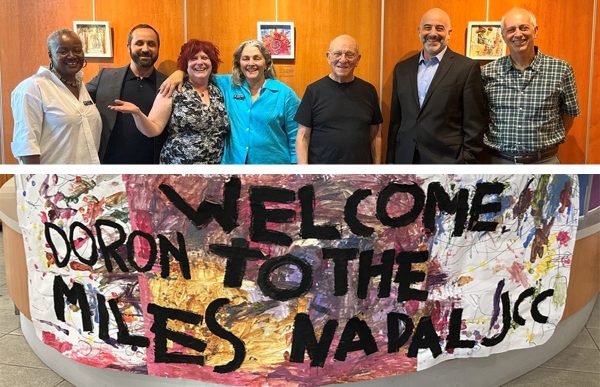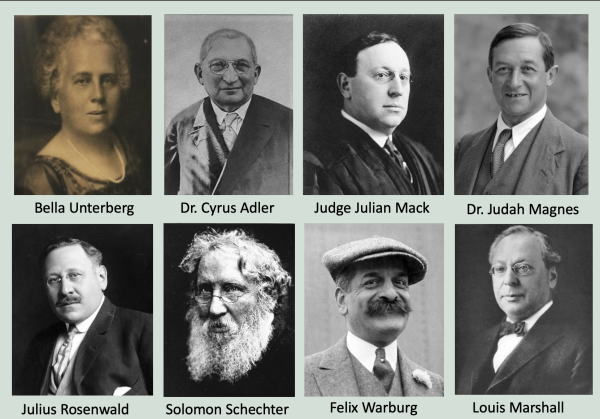By Doron Krakow
A Milestone Anniversary
This month marks 70 years since the Bloor Street YMHA in downtown Toronto, Ontario, was founded. Known today as the Miles Nadal Jewish Community Center, it is where, on June 1, I found myself giving a talk on the history of the JCC Movement, a topic about which I have found it increasingly necessary to become knowledgeable. It seems that to be a senior leader is to be seen as a historian of sorts, and the opportunity to lecture on the topic prompted me to dive into our story—an educational journey I look forward to continuing in the months and years to come.

Most of the institutions across our movement are known today as JCCs, though many still carry names that reflect prior chapters in our history—prominent among them are Ys, but also such names as Jewish Educational Alliance (Savannah, Georgia) and Jewish Community Alliance (Jacksonville, Florida). Almost all began as gathering places for newly arrived immigrant Jewish men. They came for illumination, for culture, for an opportunity to gain skills and insights that would help them adapt to their new country while sustaining ties to their roots in Judaism and our shared history as a Jewish people. From among the huge array of elements and insights about our past, I offer a few items of note to whet your appetite for more.
- The very first JCC, The Young Men’s Hebrew Literary Association in Philadelphia, Pennsylvania, opened its doors in 1850, a full year before the first YMCA (Young Men’s Christian Association) was established.
- The oldest continuously operating JCC was founded in Baltimore, Maryland, in 1854 and will soon celebrate its 170th
- The first independent Young Women’s Hebrew Association (YWHA) opened its doors in New York City in 1902 and in 1903 came under the leadership of the first woman senior executive—Bella Unterberg.
- The grandest names in American Jewry sat in leadership at both the local and national levels:
- Cyrus Adler, who later served as chancellor of the Jewish Theological Seminary
- Judge Julian Mack, a member of the U.S. Court of Appeals
- Judah Magnes, who, in 1925, became the founding president of the Hebrew University of Jerusalem, the first modern university in our ancient homeland
- Julius Rosenwald, the founder of Sears Roebuck and Company
- Solomon Schechter, the founder of United Synagogue of Conservative Judaism
- Felix Warburg, a banking magnate and founder of the American Jewish Joint Distribution Committee (“The Joint”)
- Louis Marshall, founder of the American Jewish Committee who later donated his home to serve as the YMHA in Syracuse, New York

- These extraordinary leaders engaged in years-long debates about the role of this national enterprise, advocating it become the central agency for matters of concern and interest to Jews in the United States.
- Today’s JCC Association of North America was founded in 1917 as the Jewish Welfare Board (JWB), a coalition of Jewish agencies committed to supporting the American war effort and providing for the spiritual needs of young Jewish men as America entered The Great War (World War I). A growing American Jewish community, which by then numbered over two million, was determined to play its part, and the more than 200 YMHAs that dotted the landscape of American Jewish life at the time were the wellspring of contact and connection for young Jewish men—making our movement the center of gravity for the American Jewish war effort.
- In 1921, in the aftermath of the war, JWB’s mission was extended to the Dominion of Canada.
- The term Jewish Community Center, already in use in the first decade of the 20th century, reflected the growing mandate of the movement to provide for the broad needs and interests of a burgeoning Jewish community in hundreds of localities across the continent.
Throughout the last century and in earlier times, too, our movement and its leadership faced and wrestled with many of the same issues, challenges, and opportunities we do today: Where are the appropriate boundaries between our work and that of peer and kindred sectors of the organized Jewish community? What is the right balance between focused and intentional Jewish efforts and those in support of the wider community? How do we adequately resource our priority programs, initiatives, and endeavors?
More than a century after he uttered them, the words of Louis Marshall regarding the mandate of our movement provide a vivid reminder of our core principles: “Unless our institutions shall create for themselves a Jewish atmosphere and a distinctly Jewish tendency, they have no reason whatever for existing. It is only the presence of such a tendency that makes them Jewish; not the fact that they are constructed with funds contributed by Jews, that they are officered by Jews, that Jews alone support them…”
As each JCC community reaches its next major milestone in often long and storied histories, we have an important opportunity to reflect upon the past and the journey from often humble beginnings to the realities of the present day. As we do, it is also incumbent upon us to revisit our mandate for today and to cast an eye on tomorrow. In a period of declining Jewish participation in far too many of the organizations and institutions that have helped define North American Jewish life, many JCC communities are seeing unprecedented Jewish participation. Our role today is perhaps more significant than at any time since the earliest days of the movement. No longer a function of easing the way for newly arrived immigrant Jews, the JCC Movement today is the primary locus of engagement for a largely settled and veteran Jewish population. We must affirm a commitment to capitalizing on our unique strengths, the breadth and scope of our connections with the Jewish community, and the unrivaled opportunities for partnership and collaboration with other Jewish institutions and organizations both within and across the communities we serve.
 The debate about the primary purpose of our movement that raged more than a century ago in the halls of power of American Jewish life and leadership remains a most worthy debate for us today.
The debate about the primary purpose of our movement that raged more than a century ago in the halls of power of American Jewish life and leadership remains a most worthy debate for us today.
Happy anniversary to the Miles Nadal JCC and all who benefit from its extraordinary contributions to Jewish life and community in Toronto. May you continue to go from strength to strength.
Shabbat shalom | שַׁבָּת שָׁלוֹם

Doron Krakow
President and CEO
JCC Association of North America

Little more than two weeks after Israel’s declaration of independence on May 14, 1948, a United Nations-brokered, four-week ceasefire went into effect on the morning of June 2, 1948, upon agreement by combatants on both sides of the war. The pause allowed the dead to be mourned and the toll upon the newborn state to be assessed. In the Old City of Jerusalem, nearly every synagogue had already been damaged or destroyed—while Christian and Muslim holy sites remained largely intact, a reflection on the disparate approaches to the fighting.
And that’s the way it was…
Reader Interactions